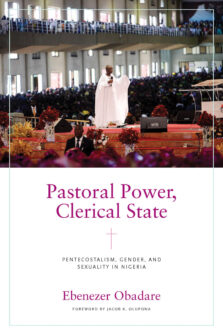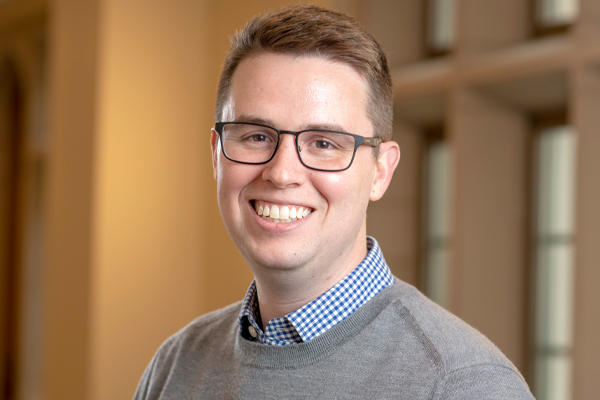 In Pastoral Power, Clerical State: Pentecostalism, Gender, and Sexuality in Nigeria, Ebenezer Obadare asks a seemingly simple question: “How is it that in contemporary Nigeria (and indeed in many other African countries where Pentecostal Christianity exercises an outsize influence) the pastor has come to occupy such a central place in the social imaginary, to such an extent that medical and other forms of professional judgment must defer to him?” (3). What this ostensibly straightforward question opens up, however, is a complex socio-historical phenomenon that reveals much about the changing nature of authority and power in post-colonial Nigeria and in other similar contexts where Pentecostalism is on the rise.
In Pastoral Power, Clerical State: Pentecostalism, Gender, and Sexuality in Nigeria, Ebenezer Obadare asks a seemingly simple question: “How is it that in contemporary Nigeria (and indeed in many other African countries where Pentecostal Christianity exercises an outsize influence) the pastor has come to occupy such a central place in the social imaginary, to such an extent that medical and other forms of professional judgment must defer to him?” (3). What this ostensibly straightforward question opens up, however, is a complex socio-historical phenomenon that reveals much about the changing nature of authority and power in post-colonial Nigeria and in other similar contexts where Pentecostalism is on the rise.
In the early days of post-independence Nigeria, Obadare contends, authority was more often wielded by intellectuals, whom Obadare refers to as the “Man of Letters” (as opposed to the Pentecostal “Man of God”). The gendering of the intellectual and pastor in this case is intentional, as in the Nigerian context the shift from one form of authority in social and political space to another is merely a shifting of patriarchal power to a different realm. Obadare’s contention is that the shift in authority is explained by the vacuum opened up by the failures of the state (and the intellectuals who supported it) to manage economic turmoil and everyday government functionality. This failure, due in no small part to problems inherited from colonial rule, has made space into which the Pentecostal pastor, with his charismatic authority, has been able to enter. This pastor does not “run” the state, as Obadare makes clear, but in his social, political, and erotic power he is able to wield authority and influence the people and by extension the government.
Obadare is also unabashed in his criticism of this model of authority. While he understands the historical and political conditions that have given rise to it, he worries about the undemocratic ends to which such power can be put. Pentecostal pastors practice a “rule by prodigy” wherein they claim to have special access to truths from the divine concerning social, political, and economic matters. Such rule by prodigy short circuits the need for democratic debate and reform and opens up the path to authoritarianism.
The contributors to this symposium take up both the normative and descriptive claims that make up Obadare’s text. Abimola A. Adelakun asks to what degree the pastor’s authority is now under threat from the forces of the digital age. Pundits, social media influences, and others have begun to question the authority of the Pentecostal pastor, thus raising the question of whether the “Man of God” might go the same way of the “Man of Letters” in the recent past that Obadare documents. Adeshina Afolayan also wonders if Obadare has overstated the influence of the Pentecostal pastor. In conversation with other scholars of Pentecostalism in Africa like Ruth Marshall and Nimi Wariboko, she argues that Obadare’s anti-clericalism leads him to this overstatement and also leads him to ignore the potential positive impact that Pentecostalism might have on Nigerian society. By ignoring such potentialities, Afolayan argues that Obadare’s book betrays a secular bias that underestimates the potential constructive aspects of religion.
Where Adelakun and Afolayan worry that the pastor’s influence has been overstated, Adriaan Van Klinken conversely worries that the continued relevance of the intelligentsia has been understated in Obadare’s portrait. Drawing on literary critiques of the pastor in Nigerian culture, Van Klinken contends that there are deep roots in African literature for critiquing the role of Christianity in politics and society. While not contending that literary figures are likely to overtake the pastor anytime soon in terms of popularity, Van Klinken reminds us that they continue to act as a “thorn in the side” of the pastor and wider movement that he represents. Karen Lauterbach also wonders to what degree we find remnants of the intellectual still present in African societies today. But rather than see the “Man of Letters” as a form distinct from the “Man of God,” she sees them as partaking in similar literary techniques and drawing on similar traditions, albeit towards different ends. For her, this raises wider questions about how spiritual and earthly authorities interact with seemingly secular liberal democratic structures.
What Obadare’s book and the contributors to this symposium encourage us to reflect on is how authority is maintained, challenged, and revoked in the modern world, and especially in postcolonial settings.
Finally, Devaka Premawardhana poses two concerns for Obadare: first, he asks if the fall from prominence of the “Man of Letters” can be causally linked to the rise of the Pentecostal pastor, and second, he wonders if Obadare places too much of the blame on Pentecostal pastors for the socio-political issues facing Nigerians today. Still, Premawardhana finds in Obadare’s work a potential spark that might ignite resistance among those who find the dogmatism linked to the “Man of God” to be problematic. In his response to all the contributors, Obadare takes up the theme of anti-anti-intellectualism as the normative impulse behind the book.
What Obadare’s book and the contributors to this symposium encourage us to reflect on is how authority is maintained, challenged, and revoked in the modern world, and especially in postcolonial settings. This has been a key question of the authority, community, and identity (ACI) research group of Contending Modernities, of which Obadare is a member, and of which this book is a product. This requires that we attend to those who wield both political and spiritual power and that we continue to challenge the idea that such forms of authority have been separated in the era of the liberal nation-state. Indeed, as Obadare demonstrates, regardless of whether we believe the pastor’s claim that his prophetic power is divinely bestowed, the effects of this claim on the socio-political realm will be real, and we ignore them at our own peril.

